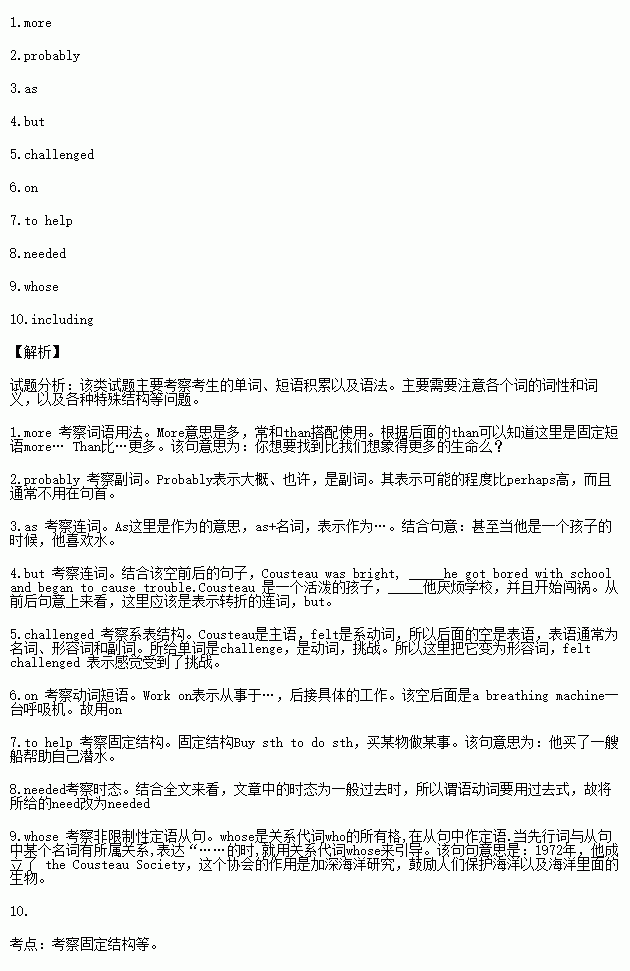题目内容
Would you like to explore (开发) the oceans? Do you want to find 1. life than we imagine there? For Jacques Cousteau, the answer was “yes”. His career was a life-long dream, and he is 2. (probable) the most famous ocean scientist in recent times.
Cousteau was born in France in 1910. Even 3. a child, he loved water. Cousteau was bright, 4. he got bored with school and began to cause trouble. His parents sent him to a strict boarding school. There, Cousteau finally felt 5. (challenge). He studied hard and did well in all his courses. In 1933, he served as a general officer in the French Navy. He also began to explore the life under the water. He worked 6. a breathing machine to stay under water longer. It was finished in 1943.
In 1948, Cousteau became a captain, and he had new duties. Even so, he continued to explore the oceans. Two years later, he became the president of the French Oceanographic Campaigns. He also bought a ship 7. (help) with his dives. But he 8. (need) a way to get money for his trips. To do that, he produced many films and published a number of books. His films include “The Silent World (1956)”, “World without Sun (1966)”. One of his books is “The Living Sea (1963)”.
In 1974, he founded the Cousteau Society, 9. function was to further oceanic research and to encourage people to help protect the oceans and the life within them.
Cousteau won many honors for his work, 10. (include) the Medal of Freedom and membership in the French Academy in 1989.
There are some strange driving laws in different countries.
Countries | Laws |
Vietnam | If you’re in Vietnam without a Vietnamese driver’s license, you risk a prison sentence of up to three years. |
Russia | In Moscow, if your car is dirty enough to draw dust art, you will be fined about 2,000 rubles (about US $55). Worse yet, it’s illegal to wash your car by hand in public places — forcing you to take it to one of the few car wash facilities. |
Thailand | Drivers —male or female — can’t drive shirtless, whether it’s a car, a bus, or a tuk-tuk cab. |
France | France requires its drivers to carry a portable breathalyzer(酒精测量仪) at all times when driving a car. The one-time breathalyzer cost around US$5, and if you don’t have one, you will be fined US$15. |
Cyprus | Raising your hands in the car can get you fined of US$35. The law states a driver can be fined if the person “is in an irregular position inside the car or raises his hand from the steering wheel unnecessarily. |
Japan | Politeness isn’t just the culture in Japan; it’s part of driving laws. Splashing a person by driving through a puddle(水坑) with your car will cost you over US$60. The country is also strict with its DUI(酒驾) laws — riding with or lending your car to a driver who gets caught drinking and driving can lead to a fine costing thousands of dollars. |
1.Where should you go to wash your car when you are in Moscow?
A. The car wash facilities.
B. Any public place
C. Your home
D. The forest
2.What can get you fined for in Cyprus?
A. Forgetting to carry a portable breathalyzer.
B. Not having a Cyprus driver’s license.
C. Putting your hands above your head when you are driving.
D. Driving without a shirt.
3.If you are fined thousands of dollars in Japan, you may have been ____.
A. in an irregular position in your car
B. sitting in a car with a drunk driver
C. splashing a person with mud
D. impolite to other drivers
4.This text can most likely be found in _______.
A. a law document
B. a fashion magazine
C. an international newspaper
D. a column on interesting cultures

